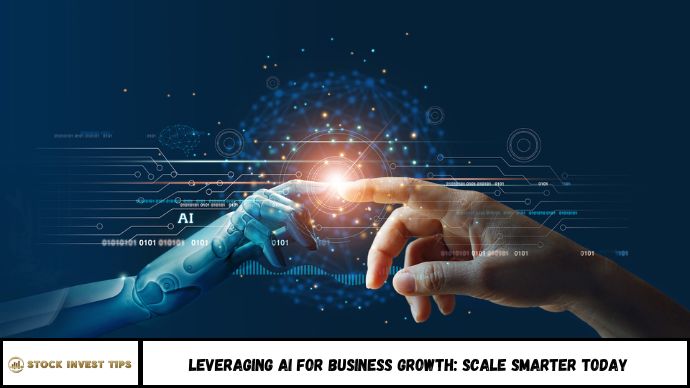Leveraging AI for business growth is no longer optional—it’s essential for staying competitive. Artificial intelligence helps companies optimize operations, enhance customer experience, and drive data-driven decisions. This article breaks down how AI fuels business success, from automation basics to advanced predictive analytics, offering practical strategies and up-to-date insights to future-proof your organization.
Artificial intelligence (AI) offers transformative potential—empowering businesses to drive efficiency, generate deep insights, and spark innovation across operations. But to truly leverage AI effectively, success doesn’t start with algorithms—it starts with strategic preparation.
In this guide, our CEO, Pavel Klachkou, walks you through the essentials of building a solid foundation for AI implementation. From data readiness to infrastructure planning, we cover the critical elements that ensure your AI projects deliver real value.
Building a Robust Data Infrastructure: The Cornerstone of AI Success
The power of AI lies in its ability to learn from data. But not just any data—high-quality, relevant, and well-managed data is essential for accurate, scalable, and ethical AI outcomes.
Yet, many organizations find themselves unprepared when it comes to making their data truly AI-ready.
To support impactful AI initiatives, you need robust systems that enable:
- Seamless access to quality data from multiple internal and external sources
- Scalable storage solutions to handle large volumes of structured and unstructured data
- Real-time data pipelines for processing and feeding information into AI models
- Strong governance frameworks that uphold privacy, security, and compliance standards
At our core, we specialize in designing and deploying enterprise-grade data architectures, pipelines, and governance strategies. These are built not just for today’s AI demands—but for tomorrow’s innovation opportunities.
Introduction: Can Your Business Afford to Ignore AI?
Imagine a company that increases productivity by 40%, reduces customer churn by half, and anticipates market trends before they happen. Sounds like science fiction? It’s not—this is what AI is already doing for leading businesses.
As AI becomes more accessible, companies of all sizes are using it to gain a competitive edge, improve decision-making, and scale with speed. The question isn’t whether you should adopt AI—it’s how fast you can adapt.
In this article, you’ll learn:
- Why AI matters for modern business success
- The key benefits of implementing AI
- Step-by-step ways to integrate AI effectively
- Real-world stats and success stories to guide your journey
Why AI Is Crucial for Business Growth
1. Automation: Saving Time, Reducing Costs
AI can automate repetitive, time-consuming tasks across departments.
- McKinsey reports that AI could automate up to 45% of work activities in the near future.
- Businesses using AI-driven automation saw cost reductions of 20–30% on average (Deloitte, 2024).
Applications Include:
- Customer service chatbots
- Invoice and payroll processing
- Inventory management
Benefit: Frees up employees to focus on high-impact, strategic work.
2. Data-Driven Decision-Making
AI analyzes massive datasets quickly and with accuracy humans can’t match.
- Businesses that use AI for decision-making are 23% more likely to outperform competitors in profitability (Harvard Business Review, 2023).
How It Helps:
- Identifies patterns and insights
- Predicts customer behavior
- Improves marketing ROI
Example: Netflix uses AI to recommend content—contributing to retention rates over 90%.
3. Enhanced Customer Experience
AI delivers personalization at scale.
- 80% of consumers are more likely to buy when brands offer personalized experiences (Epsilon, 2024).
AI Tools to Improve CX:
- Predictive chatbots
- Voice assistants
- Product recommendation engines
Outcome: Boosted engagement, increased loyalty, and higher conversions.
4. Predictive Analytics for Growth
AI models forecast future trends with astonishing accuracy.
- Retailers using AI-driven demand forecasting saw inventory costs drop by up to 35% (Gartner, 2023).
Use Cases:
- Sales forecasting
- Fraud detection
- Market trend analysis
Benefit: Make proactive, not reactive, business decisions.
5. Scalable Solutions for All Business Sizes
Whether you’re a startup or enterprise, AI tools now fit every budget.
Affordable AI platforms:
- ChatGPT for content and customer queries
- Zoho Zia for CRM insights
- Jasper and Grammarly for content optimization
Result: Even small businesses can compete with large players using smart tech.
How to Start Leveraging AI for Your Business
Step 1: Identify High-Impact Areas
Start where AI delivers quick wins:
- Customer service
- Sales forecasting
- Marketing automation
Step 2: Choose the Right Tools
Pick AI solutions that integrate easily with your current systems:
- CRM platforms with built-in AI
- Cloud-based AI analytics tools
- AI content generators for marketing
Step 3: Train Your Team
AI works best when paired with human insight:
- Upskill staff in AI basics
- Use AI to augment, not replace, human roles
Step 4: Monitor and Improve
AI systems learn continuously—track performance and refine them:
- Use KPIs like customer satisfaction, cost savings, and response time
- Iterate based on feedback and data
Real-World Success Story
Case: Coca-Cola
Coca-Cola uses AI for product development, social listening, and customer engagement. Their AI-powered vending machines adjust inventory in real-time, boosting efficiency and reducing restocking costs by 25%.
FAQs
1. What is AI in business?
AI in business refers to using intelligent machines to automate, analyze, and optimize operations and decisions.
2. How can small businesses use AI?
They can use affordable AI tools for marketing, customer service, and analytics to save time and money.
3. Is AI expensive to implement?
Not anymore—many tools offer low-cost or free tiers for small to medium-sized businesses.
4. Does AI replace human jobs?
AI augments human work, handling repetitive tasks while employees focus on creativity and strategy.
5. How fast can businesses see results from AI?
Many see improvements in efficiency or engagement within the first 3–6 months of implementation.
6. What are the risks of AI in business?
Common risks include data privacy issues and reliance on biased algorithms—but these can be mitigated with ethical practices and transparency.
Conclusion
AI is transforming how companies operate, compete, and grow. Whether you’re aiming to increase efficiency, enhance customer experience, or drive innovation, leveraging AI gives your business a powerful foundation for long-term success.

